
The Righteous Brothers are an American musical duo originally formed by Bill Medley and Bobby Hatfield but now comprising Medley and Bucky Heard. Medley formed the group with Hatfield in 1963. They had first performed together in 1962 in the Los Angeles area as part of a five-member group called the Paramours, and adopted the name The Righteous Brothers when they became a duo. Their most active recording period was in the 1960s and '70s, and, after several years inactive as a duo, Hatfield and Medley reunited in 1981 and continued to perform until Hatfield's death in 2003. The term "blue-eyed soul" is thought to have first been coined by Philadelphia radio DJ Georgie Woods in 1964 when describing the duo's music.

The Crystals are an American vocal group that originated in New York City. Considered one of the defining acts of the girl group era in the first half of the 1960s, their 1961–1964 chart hits – including "There's No Other ", "Uptown", "He's Sure the Boy I Love", "He's a Rebel", "Da Doo Ron Ron" and "Then He Kissed Me"– featured three different female lead singers and were all produced by Phil Spector. The latter three songs were originally ranked number 263, number 114, and number 493, respectively, on Rolling Stone magazine's list of The 500 Greatest Songs of All Time. However, two songs were omitted from the magazine's 2010 update, leaving only "He's a Rebel" at number 267. In the 2021 update, "Da Doo Ron Ron" was added back to the list at number 366.
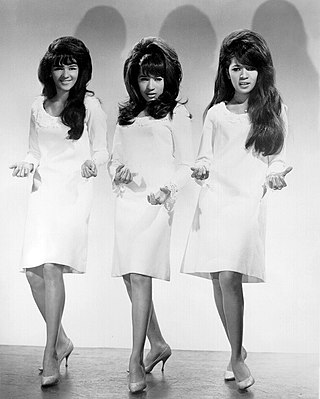
The Ronettes were an American girl group from Washington Heights, Manhattan, New York City. The group consisted of the lead singer Veronica Bennett, her older sister Estelle Bennett, and their cousin Nedra Talley. They had sung together since they were teenagers, then known as "The Darling Sisters". Signed first by Colpix Records in 1961, they moved to Phil Spector's Philles Records in March 1963 and changed their name to "The Ronettes".

Martha Rose Reeves is an American R&B and pop singer. She is best known for being the lead singer of the Motown girl group Martha and the Vandellas, which scored over a dozen hit singles, including "Come and Get These Memories", "Nowhere to Run", "Heat Wave", "Jimmy Mack", and their signature "Dancing in the Street". From 2005 until 2009, Reeves served as an elected councilwoman in her hometown of Detroit, Michigan, U.S. Martha Reeves and the Vandellas were inducted into the Rock and Roll Hall of Fame in 1995. In 2023, Rolling Stone ranked Reeves at number 151 on its list of the 200 Greatest Singers of All Time.

Darlene Wright ,[a] also known by the stage name Darlene Love, is an American R&B and soul singer and actress. She was the lead singer of the girl group the Blossoms and also a solo recording artist.
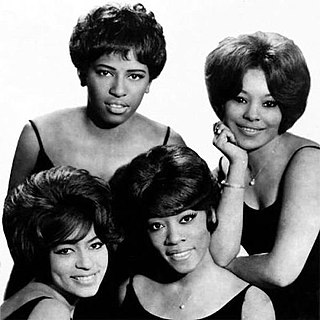
The Chiffons were an American girl group originating from the Bronx, a borough of New York City, in 1960.

The Brill Building is an office building at 1619 Broadway on 49th Street in the New York City borough of Manhattan, just north of Times Square and farther uptown from the historic musical Tin Pan Alley neighborhood. It was built in 1931 as the Alan E. Lefcourt Building, after the son of its builder Abraham E. Lefcourt, and designed by Victor Bark Jr. The building is 11 stories high and has approximately 175,000 square feet (16,300 m2) of rentable area.
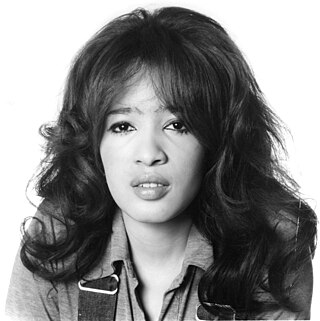
Veronica Yvette Greenfield was an American singer who co-founded and fronted the girl group The Ronettes. She is sometimes referred to as the original "bad girl of rock and roll".

Mary Louise Weiss was an American singer and interior designer, best known as the lead singer of the Shangri-Las in the 1960s. Their single "Leader of the Pack" went to number one on the Billboard Hot 100 in 1964. She had little involvement in the music scene for decades, returning in 2007 to record her first and only solo album with Norton Records.

Estelle Bennett was an American singer. She was a member of the girl group The Ronettes, along with her sister Ronnie and cousin Nedra Talley.

Eleanor Louise Greenwich was an American pop music singer, songwriter, and record producer. She wrote or co-wrote "Da Doo Ron Ron", "Be My Baby", "Maybe I Know", "Then He Kissed Me", "Do Wah Diddy Diddy", "Christmas ", "Hanky Panky", "Chapel of Love", "Leader of the Pack", and "River Deep – Mountain High", among others.
The Paris Sisters were a 1960s American girl group from San Francisco, best known for their work with record producer Phil Spector.

Susan Ann Sulley, formerly known as Susanne Sulley and Susan Ann Gayle, is an English singer. She is one of the two female vocalists in the synth-pop band The Human League, contributing co-lead vocals on the conflicting duet "Don't You Want Me" with the band's founding member and lead singer Philip Oakey.

The Blossoms were an American girl group that originated from California. During their height of success in the 1960s, the group's lineup consisted of Darlene Love, Fanita James, and Jean King.
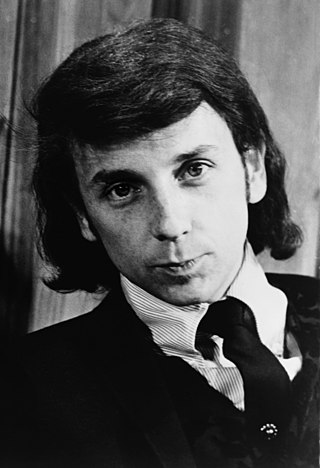
Harvey Phillip Spector was an American record producer, songwriter, and convicted murderer. He is best known for his innovative recording practices and entrepreneurship in the 1960s along with his two trials and conviction for the murder of Lana Clarkson in the 2000s. Spector developed the Wall of Sound, a production style that is characterized for its diffusion of tone colors and dense orchestral sound, which he described as a "Wagnerian" approach to rock and roll. He is widely regarded as one of the most influential figures in pop music history and one of the most successful producers of the 1960s.

"I Love How You Love Me" is a song written by Barry Mann and Larry Kolber. It was a 1961 Top Five hit for the pop girl group The Paris Sisters, which inaugurated a string of elaborately produced classic hits by Phil Spector. Bobby Vinton had a Top Ten hit in 1968 with a cover version. The song has been recorded by many other artists over the years.
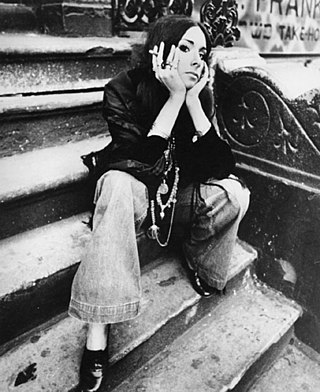
Lotti Golden is an American singer-songwriter, record producer, poet and artist. Golden is best known for her 1969 debut album Motor-Cycle, on Atlantic Records.

The Secret Sisters is an Americana singing and songwriting duo consisting of vocalists Laura Rogers and Lydia Slagle. The duo's music has been compared to artists like the Everly Brothers.

Suzanna Choffel is an American singer-songwriter and musician who has appeared on national television and in film. Known for her distinct voice and reggae-inspired guitar technique, her music has been described as "a unique sound equal parts Beat poetry, smoky soul grooves and indie-pop eccentricity."

Edna Wright was an American singer, best known as the lead singer of Honey Cone, the girl group that went to No. 1 on the Billboard Hot 100 with the song "Want Ads" in 1971. She was the younger sister of singer Darlene Love. Wright sang backup for various artists, including the Righteous Brothers, Ray Charles, and Cher.


















